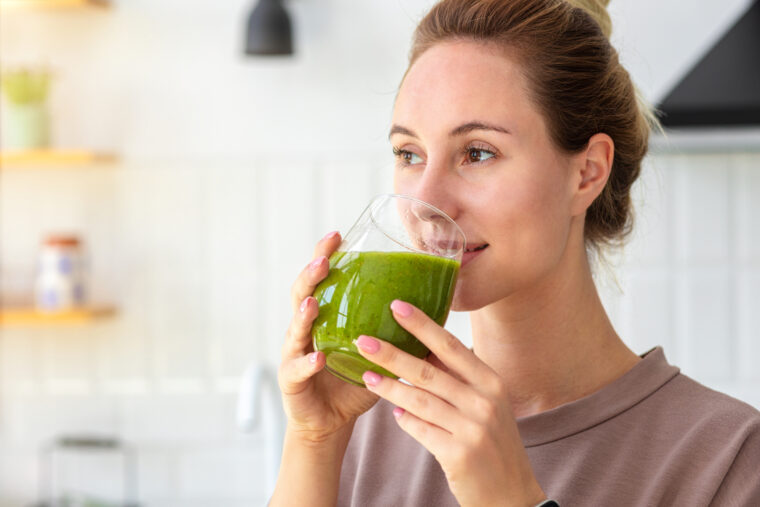How can you support your gut health naturally? We directly affect our guts with the foods and drinks we consume, so focusing on maintaining a balanced, healthy diet is a good place to start.
Add more fibre to your diet
Fibre is a carbohydrate found in plant-based foods like fruit, vegetables, legumes, and whole grains. Fibre contains parts of plants that the body can’t digest and absorb, so it passes through the digestive tract somewhat intact and is expelled the same way. This is why fibre can help bulk up stools to help them pass easily, and keep you full for longer. This is how fibre can help keep your bowels moving. There are two types of fibre:
- Soluble fibre dissolves in water to create a gel-like substance that slows down digestion. Soluble fibre can be found in peas, beans, oats, bananas, carrots, and barley.
- Insoluble fibre doesn’t dissolve in water, so it helps move things along in the digestive tract, bulks up stools, and can be helpful to keep your bowels regular. Insoluble fibre is found in whole wheats, nuts, beans, green beans, and potatoes.
Probiotics and prebiotics
Healthy guts have diverse microbe colonies that feed on a wide range of (mostly) healthy foods. You can influence the makeup of your gut microbiome by the foods you eat, and you can also directly ingest friendly microbes through probiotic foods like tempeh, yogurt, sauerkraut, kefir, miso, and kimchi.
While you’re growing your healthy microbe community, you can also keep them well-fed and healthy by eating prebiotic foods – which feed the gut microbiome and help keep the gut healthy – such as whole grains, artichokes, garlic, onions, leeks, bananas, oats, barley, apples, flaxseeds, seaweed, avocado, and coco. Aim to eat 30 different plants a week to help keep your healthy microbes happy.
Listen to your body
The food that you eat should help you feel good in your body. If you feel bloated, or nauseous, or have an upset stomach after eating certain foods, there’s a chance you may be intolerant. Cut out potentially problematic foods – one at a time – to see if it makes a difference.
Stay hydrated
Drinking water helps with digestion. Water can help break down food, so the nutrients can be absorbed, soften stools to make them pass easily, and support a healthy gut microbiome. Try to always keep a water bottle with you, and drink during or after meals to help with digestion.
Get regular exercise
Exercise has many benefits, and a potentially surprising perk of regular exercise is that it improves gut health! Our gut has muscles which help move food through the digestive tract and out of our bodies. Exercise can help strengthen all muscles – including those responsible for peristalsis (the involuntary, wave-like motion which helps move food through the digestive tract) – and so strengthening the muscles that line the GI tract can make it easier to empty your bowels. If that wasn’t enough, exercise also improves circulation, which helps move blood and oxygen around the body. Circulation helps the gut to maintain its balance and stay healthy and strong. A faster metabolism can influence how quickly we digest food – and you can increase your metabolism through exercise.
Manage stress
Imagine you’re about to walk onto a stage and deliver a speech to 20,000 people. How do you feel? Is there a jumpy feeling in your stomach? Do you feel nauseous? Are you worried you might have to bolt to the toilet? Our bodies evolved with a fight or flight response, which can help us run away extra fast if we come across a lion or freeze to avoid unwanted attention from the group of hyenas across the clearing. Stress directly impacts the digestive system: studies on humans have found that stress can reduce the friendly bacteria present in the gut.
Stress slows digestion, which can lead to bloating or constipation. It can also prompt your body to expel waste, which can result in diarrhoea and stomach pain. The good news is that we can physically reduce stress symptoms by calming the nervous system. This can be as simple as putting your hand on your stomach, taking four deep breaths in, and four deep breaths out. Mindfulness – where you bring yourself into the present moment rather than worrying about the future or regretting the past – can also help reduce stress and promote relaxation. Meditation, exercise, mindful movements like yoga, being in nature, spending time with loved ones, platonic touch, cuddling with pets, journaling, and allowing yourself time to rest can also be very helpful.








